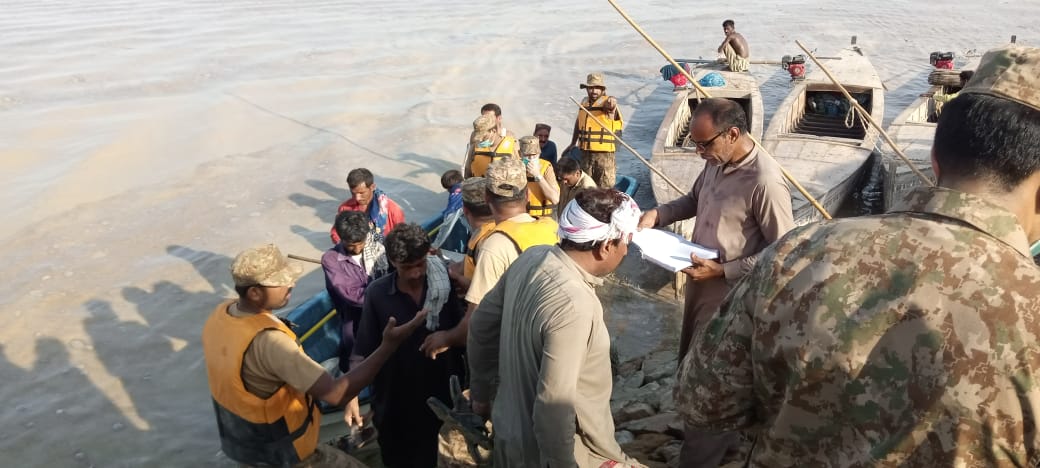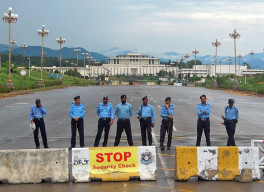
Rainfall in Sindh continued to trigger canal breaches that led to flooding in six districts of the province on Sunday, inundating scores of villages and destroying vast acres of crops over the weekend.
In Dadu, where water swept through the Kachho area starting on Saturday, the tally of submerged villages rose to 50 on Sunday as the Nai Gaj river swelled and a breach erupted in the FB embankment. At least 200 katcha houses were demolished, while over 200,000 acres of standing crops were inundated, causing huge financial losses to farmers.
As the torrents rose chest-deep, people climbed onto trees to save themselves while their livestock and belongings washed away. People from dozens of villages around Johi taluka began evacuating the area when reports of the embankments erosion began circulating.
Meanwhile, a 100-feet wide rupture in the Kalach branch in Garhi Khero, Jacobabad, deluged thousands of acres of fields, destroying rice crops and causing huge financial losses to farmers. Residents complained that the irrigation staff had acted behindhand, adding that a prompt response when the breach was only a few feet wide could have saved their lands.
The rice crop in Lakhi Ghulam Shah, a rural town in Shikarpur, was also devastated when water broke through a 30-feet opening in the Sherkot branch.
"The water entered several villages and plunged our houses in ankle-deep to knee-deep water," Amnullah Mahar, an area resident, told the media. Villagers here too blamed the irrigation department for their predicament, claiming that it took officials over half a day to begin trying to close the gap. They further stated that they had been pointing out the weak dyke to irrigation officials for months, but to no avail.
Hundreds of acres of land were also inundated in Saleh Pat, Sukkur, after a breach emerged in Bambli Minor, an irrigation channel. Rasool Bux Shimbani, from Paidaish Shah village, narrated that a 30-feet-wide breach opened up, which the villagers attempted to fix themselves when irrigation officials failed to respond in time.
In Ghotki's Khanpur Mahar, the Mubarapur Minor developed two ruptures - one 20 feet wide and the other 300 feet wide - flooding hundreds of acres. According to sub-divisional officer (SDO) Sachal Naich, the breaches occurred due to rain, but villagers claimed they were a result of the irrigation department's negligence in closing the minor's regulator gates.
Taken unawares
Visiting Dadu's flooded areas on Sunday, Sindh Chief Minister Syed Murad Ali Shah claimed the Pakistan Meteorological Department had forecast heavy rains in the coastal districts, as well as Mirpurkhas, Nawabshah and Badin. "But we were told [Sindh's] north would experience less rain," he stated, adding that despite this, he had appointed focal persons for rain emergency measures.
He further told the media that the FP embankment breach would take three or four days to plug, adding that the stranded people were being evacuated to safety.
"The affected people will have to spend a few days in relief centres after their evacuation," he explained, stressing the need to close all breaches before the next monsoon spell struck.
According to Shah, the strong waves meant that local boats could not be mobilised for rescue work and so, the Pakistan Navy had been requested to undertake the task. Meanwhile, he added, the Pakistan Army had been unable to launch aerial rescue operations on Saturday due to bad weather.
He added that he would conduct an inquiry into why the irrigation department did not act in time in Dadu.
Delayed response
Meanwhile, Pakistan Tehreek-e-Insaf MPA Haleem Adil Sheikh lambasted the Sindh government for delayed rescue operations, also criticising the reparation exercise.
"Irrigation officials are lifting stones from one part of the FB embankment to plug breaches in other parts. This will weaken the stronger parts, which then may also develop breaches if it rains heavily again," he said.
He further questioned why the Provincial Disaster Management Authority was ill-prepared for flooding when heavy rain had been predicted and the government was aware of the potential threat of hill torrents.
"Agricultural land and livestock have been washed away by the flood and we still don't know the extent of damage," he stated, claiming that around 200 villages had been affected. "The Sindh government should have called the army for rescue operations a day before the rain began."
*With additional information from PPI

















COMMENTS
Comments are moderated and generally will be posted if they are on-topic and not abusive.
For more information, please see our Comments FAQ